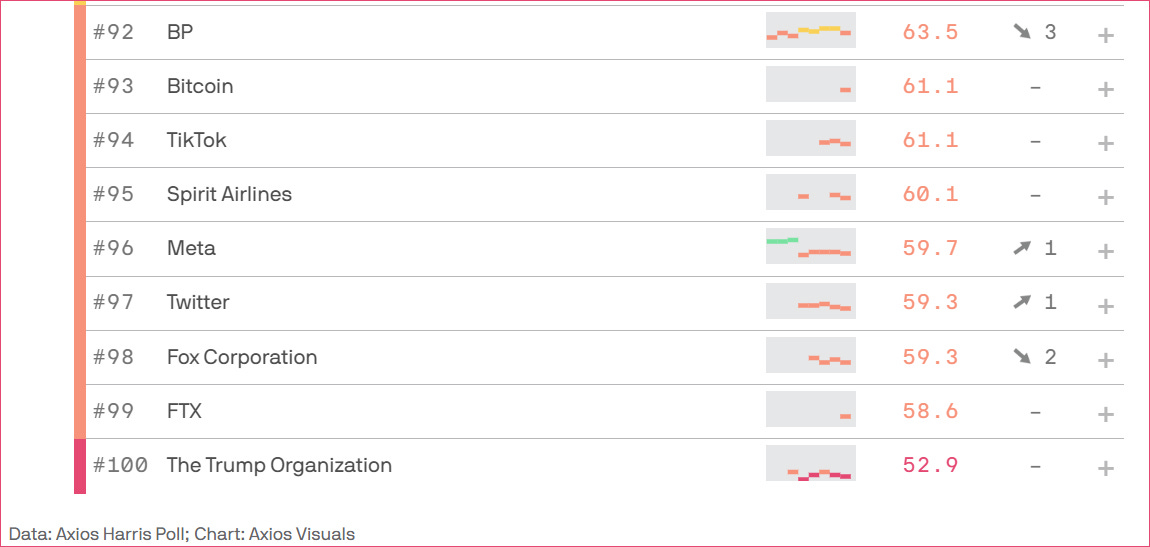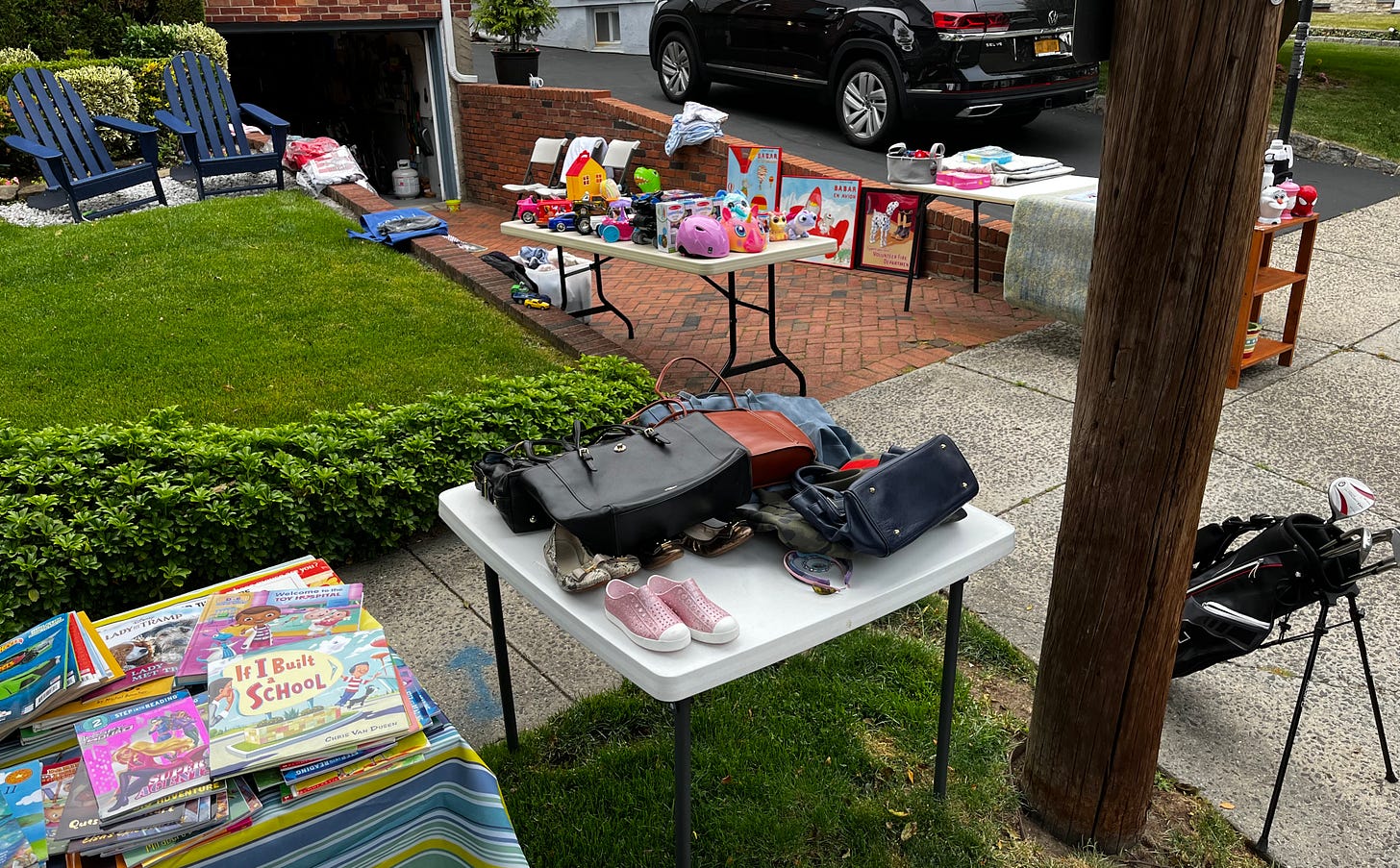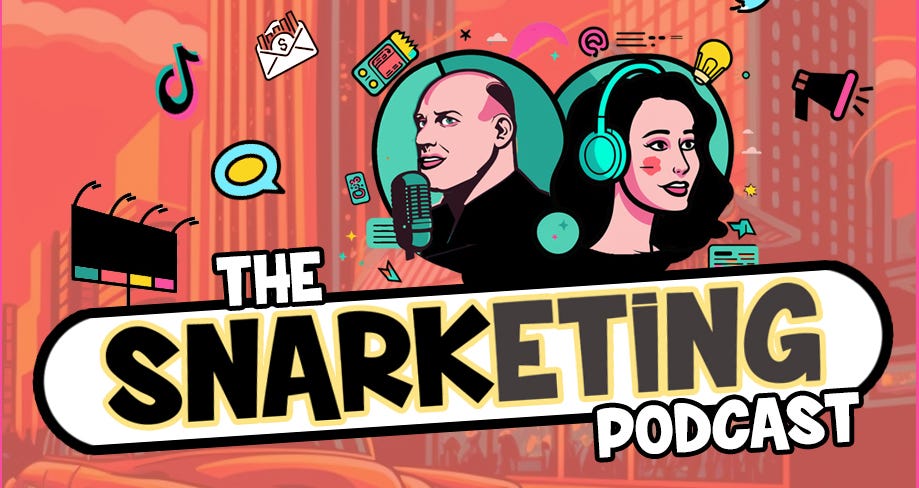PPPPutting Our Junk In Your Trunk (Four Ps #212)
Garage Sales and the Broader Lessons for Personal, Professional, Practical, and Political Success
Everything I've ever learned about business over the past 2+ decades led me to this.
No, I'm not referring to my new creator agency role (though I've been preparing for that for my entire career, as well).
I'm talking about my family’s participation in our first-ever neighborhood Garage Sale extravaganza this past weekend.
There may be nothing more “American” than a good old fashioned yard sale, which is a microcosm for all aspects of running a business, just as a localized, accelerated 1x activation: product, marketing, sales, operations, customer success, etc. And in selling over 100 items for hundreds of dollars in just a few hours on Saturday, we also learned some lessons:
Know your customer, and serve your customer.
It pays to be social, and being social pays.
Family isn't everything, but it's the most important thing.
Innovation means respecting boundaries but eliminating borders.
And with those key takeaways as our guiding themes, let's dive into the Four Ps.
SOMETHING PRACTICAL: Know Your Customer, Serve Your Customer.
History is littered with beautiful ideas that have been twisted by their execution. Market forces have little regard for an entrepreneur's intentions or the grandiosity of their vision. As the saying goes, "No strategy survives first contact with the enemy," and the same applies to business. Even the most meticulously laid plans often crumble when faced with the realities of the market.
At our garage sale, I applied key retail, sales, and social/digital marketing learnings to our 1-day pop-up shop:
First, the setup: We grouped complementary items, placed "big ticket" things in visible and prominent locations from the street, and curated a consumer journey from table to table that drew them in but made it harder to exit. I also tagged items with initial high prices, then slashed them out and put lower prices to make the consumer think they were getting a discount.
And, of course, I directed some of my community management experience to the art of the sale. I learned about my shoppers by asking what they were looking for, learned their children's names and ages, and told stories about the emotional connections that our family had to key items. I also revisited some data we kept from a trial run last year, joining a neighbor's garage sale with a more focused initial offering of cra... errr... household extras. But our key strategy was to pair our conversion-focused content with equity-building, engaging content... specifically homemade lemonade from my daughter and her friends.
I've also learned more about audience segmentation thanks to the rise of social media platforms in the past decade than on all other channels and all previous years combined. So evaluating our garage sale customers based on what kind of car they drove, then and adapting pricing strategies based on previous consumer feedback and experiences were keys to our success.
With our garage sale, there was something about the in-person interactions that made the experience more meaningful and exhilarating. Non-digital. But the real secret to our success required relying on an old, forgotten friend…
SOMETHING PROFESSIONAL: It Pays to Be Social... And Being Social Pays.
Even as our local Civic Association had been planning the 30+ house garage sale across 16 square blocks for months, they astonishingly neglected to plan ANY promotion or marketing besides putting up some flyers within our small neighborhood. So my last-minute efforts (panic?) focused on messaging efforts in a familiar place: Facebook.
I even posted updated photos throughout the day to these Facebook groups to show what remained for sale. Always on, real-time marketing is still a thing, baby!
When it comes to publicizing town events, even regional garage sales, nothing beats the big, blue, old bear. Yes, still. Even with just a few well-placed posts, the traffic turned up, stayed steady, and hit the right audiences even without paid amplification. No other site or platform was even an option.
Social media is in a weird place these days. The platforms all struggle with monetization, brand identity, and consumer trust. According to the 2023 Axios Harris Poll 100 reputation rankings, they are among the least trusted brands in America2023 Axios Harris Poll 100 reputation rankings. The survey, which gauges the reputation of the most visible brands in America based on 20 years of research, placed TikTok, Meta, and Twitter as "very poor," ranking only above Fox Corporation, FTX, and the Trump Organization on the list of 100 brands evaluated. Yikes.
The teams at Meta, Tiktok, and Snap ALL told me within the last week that monetization of their content and audience is the top priority. So where and when did things change so drastically? In some ways, the social giants have lost their way... or maybe they just had unrealistic ambitions for what they can be next.
Facebook and Instagram first rose to prominence by creating an impenetrable social graph, fortified by network effects that shielded them from new entrants. Along came TikTok, the rule-breaker that turned the game on its head. Instead of obsessing over social graphs, TikTok leveraged the power of A.I. to deliver the most captivating content to its users. They reimagined "social" media by eliminating the need for friends to participate. Meaning: less social. The release of their AI chatbot, Tako, could turbo charge their place in search, offering users relevant videos/content depending on what they need at any given time.
Apple's privacy updates dealt a severe blow to platforms reliant on advertising revenue. The market conditions weren't in favor either, but Apple's privacy changes made mobile tracking significantly more challenging. Long-form newsletters (hi-yeeee!), podcasts (stay tuned for more), and metaverse communities are challenging the early heavyweights like Meta. Their new headset, coming soon, is also a direct challenge to Meta’s Oculus (though not comparable yet in price). Even with its garage sale promotional prowess, this series of punches hit Meta hard, resulting in billions of dollars in lost revenue. Meta’s unprecedented vulnerability is truly a sight to behold.
More broadly, the industry that has polarized the world may be on the brink of a massive reorganization, and it means different things for brands, creators, consumers, investors, operators, and founders. These companies are chasing different dreams, each reaching for a distant goal. Meta yearns for the metaverse, Snap pins its hopes on an augmented reality revolution, and Twitter fantasizes about becoming relevant again on the path to becoming a "super app X." Admirable visions, indeed, even if their realization seems far from imminent.
While it's premature to declare the end of the social media (Web 2.0) era, there's an unmistakable sense of change in the air. Over the past 18 months, each relevant platform has faced disruptions that appear more than transitory. Economic pressures, intensifying competition, technological shifts, geopolitical drama, ownership changes, and business model uncertainties are real, and these industry leaders seem ripe for disruption, their positions threatened like never before.
Social channels steal our attention, cloud our minds, distort our relationships, and erode truth. They have made us cruel, jealous, and dishonest. They have nurtured anxiety and depression while sowing seeds of distrust in democracy. We find ourselves in a perpetual state of distraction, constantly diverted from what truly matters. In a bygone era, we would have called this source of ill deeds demonic, pestilent, a harbinger of dark magic.
Whether insurgent platforms like BeReal, Meta's Barcelona, Lemon8, Blue Sky, Poparazzi, and Mastodon can rectify the perceived shortcomings of their predecessors, prioritize meaningful connections, and return to the original goal of social media remains to be seen.
But let's please not forget the noble mission of social media that we believed in: connecting people. Providing spaces to meet, share, learn, connect, and speak. It's a grand vision that captivated dreamers and investors alike, offering the opportunity to unite and rebuild the Tower of Babel. After all, connectivity is THE prerequisite for enduring and intergalactic humanity.
And a successful garage sale.
SOMETHING PERSONAL: Family Isn't Everything, But It's the Most Important Thing
Our garage sale was truly a family affair. Weeks of gathering unused items from closets, bins, baskets, drawers, and other nooks resulted was a fun exercise in prioritization and “letting go,” while compensating our kids with earnings for the sale of their goods helped them understand the value of their possessions.
Many of our garage sale visitors represented more underprivileged sectors of our community, some of whom were shopping for goods to send back to native countries. Or searching for second-hand items to use every day in their homes. It provided us with some humble awareness of the unfortunate socio-economic disparities even amongst people and families in our area, a reminder of how fortunate we are despite relatively minor daily challenges.
In an age where the competition for attention is real, we're losing the battle to external factors. These days, it's rare that all four of us are home together, participating in a common activity. School, work, travel, sports, activities, electronic devices, newsletter writing, and a forthcoming podcast all vie for our attention and pull us away from each other. Which is why I truly tried to savor those moments “working the curb.”
Another reason… our upcoming family diaspora. In just two weeks, I'll be returning to the South of France for the Cannes Lions (previewed in the next episode of the Four Ps). The night before I go away on this annual trip, I often find myself overcome with emotion. A week away… an ocean apart… always falls between Father's Day and my birthday, and includes my son's birthday, the last week of school (often graduation), and, this year, my daughter's departure for sleepaway camp for the first time (more on this next edition).
What do I gain on these trips? Connection: business connections, social connections, cultural connections, and even spiritual connections. I truly love spending time with others in my industry... learning, laughing, and living. Marketers are my people. This is why a good friend and fellow marketer, Outfront Media's Valerie Vespa, and I are launching a podcast next week. We call it "The Snarketing Podcast."
Why "snarketing?" Well, we're talking with marketers, to marketers… but with our snarky blend of entertainment and education. We'll have incredibly inspiring guests, experts in their own right. But we're never going to take ourselves too seriously. After all, it's just marketing. Our first two episodes will drop on June 14, including a Cannes preview, and I look forward to welcoming some of you as guests in the near future.
SOMETHING POLITICAL: Innovation Means Respecting Boundaries, Eliminating Borders
When 30+ homes in a tight radius are joining together for a community garage sale, everyone is a frienemy. You want to sell more items to customers knowing budgets are limited and supply is not… but you're also rooting for everyone to succeed. And when your immediate next-door neighbors are both taking part, cooperation trumps competition. You can't sell similar items for different prices, and you often end up bartering for shit you didn't know you needed. (Welcome to the family, Endy Chavez Mets Bobblehead!). It got to the point that we were pitching and selling together in an increasingly fluid process.
If only the same could be said in broader business, as well as within our country, and across the global economy. But we're not wired that way. We are wired to compete and cut throats. Cooperation is a dirty word, and technology has made us more connected, more wireless, and individually rewired how we interact in macros and micro settings.
It's getting so tenuous that the founders and CEOs of A.I. tech companies just penned a warning letter to governments all over the world calling for regulation to prevent mass human extinction. Fun! But on the flip side, if you can't beat them, join them. The FDA just approved a new company called Neuralink (another new company by Elon Musk) to begin testing something you may or may not like: brain chip implantation technology.
Founded in 2016, Neuralink claims to be developing implantable brain-computer interfaces. Their grand mission is to create a direct line of communication between our brains and computers, effectively turning us into human-AI hybrids. Isn't that just what we've all been dreaming of? The "Link" is about the size of five stacked coins and designed to be surgically implanted into your brain, because who needs personal boundaries or concerns about invasive procedures when you can have a brain chip?
The Link supposedly contains electrodes that can record neural activity and even stimulate specific areas of the brain. Neuralink's researchers hope this brain chip will work wonders for treating paralysis, spinal cord injuries, and brain disorders. Just imagine a future where we all have shiny brain implants and can play video games with our thoughts. What a time to be alive!
The charming anecdotes they offer as evidence of their technological prowess are real: A monkey can play a video game using only its brain as a controller; A paralyzed man can miraculously walk again thanks to AI. Massive technological advancements, industry disruption, and now the next big thing… merging Human Intelligence with A.I. will bring us closer to the singularity, where we'll all be plugged into the Matrix and subservient to our A.I. overlords.
Or maybe, just maybe, we should take a step back, unplug, unwind, have a glass of lemonade, sell some children's toys, tools, and old clothes, and connect with neighbors, friends, and strangers as a true means of letting go of the past and embracing a lighter, freer future... with slightly less junk in my garage, and slightly more in yours.










